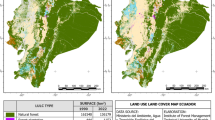Abstract
Decisions resulting from multi-objective planning models are quite sensitive to objective weights, and the latter are hard to determine accurately. We describe a robust formulation of a bi-objective multi-period planning problem where objective weights are random, independent and uniformly distributed in a predetermined range. We apply this model to a 245,090 ha forest in British Columbia, Canada, where the amount of employment and the proportion of old forest through the planning horizon are the two management objectives. Evaluated under simulated scenarios of weights, robust solutions produce more stable weighted sum of the objectives through the planning periods than traditional deterministic solutions. In other words, no large changes in the weighted sum of the objectives are expected even when the weights change over time. With this approach, we envision that these types of decisions will be better accepted by stakeholders and other social actors involved in the decision-making process.





Similar content being viewed by others
References
Ananda J, Herath G (2009) A critical review of multi-criteria decision making methods with special reference to forest management and planning. Ecol Econ 68:2235–2248
Ben-Tal A, Nemirovski A (1998) Robust convex optimization. Math Oper Res 23:769–805
Ben-Tal A, Nemirovski A (2000) Robust solutions of linear programming problems contaminated with uncertain data. Math Program 88:411–424
Bertsimas D, Sim M (2003) Robust discrete optimization and network flows. Math Program 98:49–71
Bertsimas D, Sim M (2004) The price of robustness. Oper Res 52:35–53
Bertsimas D, Thiele A (2006) A robust optimization approach to inventory theory. Oper Res 54:150–168
Butler J, Jia JM, Dyer J (1997) Simulation techniques for the sensitivity analysis of multi-criteria decision models. Eur J Oper Res 103:531–546
Cohon JL (1978) Multiobjective programming and planning. Academic Press, New York
Diaz-Balteiro L, Romero C (2008) Making forestry decisions with multiple criteria: A review and an assessment. For Ecol Manage 255:3222–3241
Eckenrode RT (1965) Weighting multiple criteria. Manage Sci 12:180–192
El Ghaoui L, Lebret H (1997) Robust solutions to least-squares problems with uncertain data. Siam J Matrix Anal Appl 18:1035–1064
El Ghaoui L, Oustry F, Lebret H (1998) Robust solutions to uncertain semidefinite programs. SIAM J Optim 9:33–52
Ells A, Bulte E, vanKooten GC (1997) Uncertainty and forest land use allocation in British Columbia: vague priorities and imprecise coefficients. For Sci 43:509–520
Gong P (1992) Multiobjective dynamic programming for forest resource management. For Ecol Manage 48:43–54
Johnson KN, Scheurman HL (1977) Techniques for prescribing optimal timber harvest and investment under different objectives—discussion and synthesis. For Sci 1–31
Kangas J (1994) An approach to public-participation in strategic forest management planning. For Ecol Manage 70:75–88
Kangas A (2006) The risk of decision making with incomplete criteria weight information. Can J For Res 36:195–205
Kangas J, Kurttila M, Kajanus M, Kangas A (2003) Evaluating the management strategies of a forestland estate—the S-O-S approach. J Environ Manage 69:349–358
Kangas AS, Kangas J, Lahdelma R, Salminen P (2006) Using SMAA-2 method with dependent uncertainties for strategic forest planning. For Policy Econ 9(2):113–125
Kurttila M, Muinonen E, Leskinen P, Kilpeläinen H, Pykäläinen J (2009) An approach for examining the effects of preferential uncertainty on the contents of forest management plan at stand and holding level. Eur J For Res 128:37–50
Lahdelma R, Hokkanen J, Salminen P (1998) SMAA—Stochastic multiobjective acceptability analysis. Eur J Oper Res 106:137–143
Liesiö J, Mild P, Salo A (2007) Preference programming for robust portfolio modeling and project selection. Eur J Oper Res 181:1488–1505
Ma J, Fan Z, Huang L (1999) A subjective and objective integrated approach to determine attribute weights. Eur J Oper Res 112:397–404
Martinson FK (1993) Fuzzy v/s minmax weighted multiobjective linear-programming: illustrative comparisons. Decis Sci 24:809–824
Mulvey JM, Vanderbei RJ, Zenios SA (1995) Robust optimization of large-scale systems. Oper Res 43:264–281
Palma CD, Nelson JD (2009) A robust optimization approach protected harvest scheduling decisions against uncertainty. Can J For Res 39:342–355
Pekelman D, Sen SK (1974) Mathematical programming models for determination of attribute weights. Manage Sci Ser B-Appl 20:1217–1229
Pukkala T (1998) Multiple risks in multi-objective forest planning: integration and importance. For Ecol Manage 111:265–284
Pukkala T, Miina J (1997) A method for stochastic multiobjective optimization of stand management. For Ecol Manage 98:189–203
Rao JR, Roy N (1989) Fuzzy set theoretic approach of assigning weights to objectives in multicriteria decision-making. Int J Syst Sci 20:1381–1386
Soyster AL (1973) Convex programming with set-inclusive constraints and applications to inexact linear-programming. Oper Res 21:1154–1157
Steuer RE (1986) Multiple criteria optimization: theory, computation, and application. Wiley, New York
Acknowledgments
This research was supported by a grant from the Natural Sciences and Engineering Research Council of Canada. We thank the editor and three anonymous reviewers for their comments and suggestions that helped us to improve the original version of this manuscript.
Author information
Authors and Affiliations
Corresponding author
Additional information
Communicated by Martin Moog.
Rights and permissions
About this article
Cite this article
Palma, C.D., Nelson, J.D. Bi-objective multi-period planning with uncertain weights: a robust optimization approach. Eur J Forest Res 129, 1081–1091 (2010). https://doi.org/10.1007/s10342-010-0393-0
Received:
Revised:
Accepted:
Published:
Issue Date:
DOI: https://doi.org/10.1007/s10342-010-0393-0




